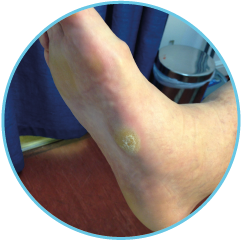Callus or calluses can be defined as areas of thickened, usually dry hard skin. Calluses can sometimes have the appearance of hard yellow skin. Patients often describe a burning sensation when walking and generalised discomfort when weight bearing. The skin may be sensitive to touch and a difference in skin texture can be felt. Patients often present complaining of segs underneath their feet, these are usually found to be areas of callus.
What causes Callus and Hard Skin
Callus develops as a result of adverse or excessive pressures placed upon the feet. Callus is a completely normal process, it is a natural method of protecting the skin and underlying foot structures. The skin under pressure and friction initially begins to thicken as a form of protection, however over time an excessive amount of callus/hard skin can build up and become uncomfortable. This is problematic for the patient as the hard skin can cause discomfort and for some people callus can be extremely painful.
Callus can form on any area of the feet. But mostly calluses appear on the ball of the feet, around the edges of the heels and often on top of the toes. As stated callus formation is a completely normal process. However, painful areas of callus on the feet can be a sign that there is excessive force to the area of skin involved. There are multiple causative factors of callus build up, but in general it is due to tight fitting shoes, abnormality in bone structure, or changes in gait (walking), a patients weight can also be a major factor. If a patient is suffering from painful callus, they can be easily treated by the chiropodist with routine treatment.
Treatments for callus/hard skin
Correct diagnosis and routine thorough routine chiropody treatment is the key to relieving painful problematic callus. The chiropodist will fully assess your whole foot health and identify the causative factors in the callus formation. The chiropodist will address all the causative factors as well as physically removing/treating the callus itself, they will also offer advice on preventative measures to prevent or minimise future callus build up.
Clinical reduction of Callus
Routine treatment will involve physical debridement or paring away of the callus/hard skin with a surgical scalpel. This physical reduction of thickened hard skin will provide immediate relief and make feet feel more comfortable.
Clinical reduction of hard skin/callus will give short to medium term relief, and unless the causative factors are identified and considered the callus will return.
In general if a patient suffers from painful callus, it is usually due to multiple factors and regular routine chiropody treatment will be required. Usually once a patient has entered into a treatment regime the causative factors are identified and dealt with and over time the problematic callus reduces and becomes more manageable. Please contact the clinic if you are suffering from problematic callus and wish to book an appointment for routine chiropody treatment.
Bio-mechanical assessment and callus
If your chiropodist thinks that the patient may benefit from orthotics (insoles) they will advise a full bio-mechanical assessment. The chiropodist will fully assess your foot structure, examine the type and range of movement/motion available in your feet, this may include standing, walking and gait analysis. Using the information the chiropodist will asses how well your feet/foot is functioning (how well it is working). If poor foot function is leading to excessive high pressures causing callus formation the chiropodist will recommend an insole or orthotic to help improve the foot function and correct any clinically diagnosed foot abnormality. Orthotics/insoles are supportive inserts that fit into good footwear. They may not always fully cure problematic callus/hard skin, but with improved foot function will help reduce excessive forces/friction and improve general foot health. The main reason orthotics/insoles may work is that they effectively redistribute pressure away from any painful areas of hard skin. There are a broad range of different types of orthotics available. These may be simple chair side insoles, like Poron, available in three different sizes over the counter in the clinic. If Orthotics are required, at Stockport Chiropody Clinic we use ICB orthotics, which are a fantastic patient friendly and affordable product. If your clinical diagnosis means that you can benefit from orthotics, the ICB heat moulded insoles can be custom moulded and fitted within the clinic. Please speak to the team if you think you require insoles.
Creams
Foot creams, more specifically ’emollients’ will help keep skin moist and supple so that skin can resist pressure better. The daily use of emollients/ foot creams will keep skin hydrated and ultimately slow callus formation by softening skin. At Stockport Chiropodist ClinIc LLp the most popular brand of foot cream is Eureaka. see products.
Shoes and Footwear
A major cause or contributing factor of problematic callus/hard skin is undoubtably footwear. Tight constrictive footwear that causes adverse high pressures over the whole foot will cause the formation of painful callus. Good quality accommodating/supportive footwear is recommended, this reduces pressure and friction. Your chiropodist will happily advise you on good footwear.
Padding Protection and Cushing Insoles
At Stockport Chiropody Clinic we have a range of pressure relieving products available at affordable prices. These provided relief and cushioning and protection from high pressure areas. The chiropodist will fully assess your feet and general foot health, if they feel you would benefit from a certain product they will advise you accordingly. The most popular insoles provided is medical grade Poron insoles. This high quality cushioning insole is a specialist product used in chiropody/ Podiatry and by Physiotherapists. Unlike many cushioning insoles available, medical grade Poron provides fully elastic cushioning for underneath the foot, meaning it does not bottom out or flatten under pressure. Various sizes are available in clinic, over the counter or if required the chiropodist can make them made to measure.

